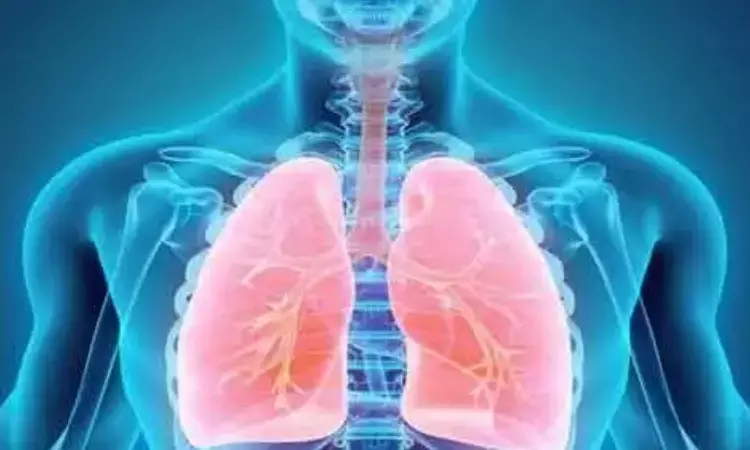- Home
- Medical news & Guidelines
- Anesthesiology
- Cardiology and CTVS
- Critical Care
- Dentistry
- Dermatology
- Diabetes and Endocrinology
- ENT
- Gastroenterology
- Medicine
- Nephrology
- Neurology
- Obstretics-Gynaecology
- Oncology
- Ophthalmology
- Orthopaedics
- Pediatrics-Neonatology
- Psychiatry
- Pulmonology
- Radiology
- Surgery
- Urology
- Laboratory Medicine
- Diet
- Nursing
- Paramedical
- Physiotherapy
- Health news
- Fact Check
- Bone Health Fact Check
- Brain Health Fact Check
- Cancer Related Fact Check
- Child Care Fact Check
- Dental and oral health fact check
- Diabetes and metabolic health fact check
- Diet and Nutrition Fact Check
- Eye and ENT Care Fact Check
- Fitness fact check
- Gut health fact check
- Heart health fact check
- Kidney health fact check
- Medical education fact check
- Men's health fact check
- Respiratory fact check
- Skin and hair care fact check
- Vaccine and Immunization fact check
- Women's health fact check
- AYUSH
- State News
- Andaman and Nicobar Islands
- Andhra Pradesh
- Arunachal Pradesh
- Assam
- Bihar
- Chandigarh
- Chattisgarh
- Dadra and Nagar Haveli
- Daman and Diu
- Delhi
- Goa
- Gujarat
- Haryana
- Himachal Pradesh
- Jammu & Kashmir
- Jharkhand
- Karnataka
- Kerala
- Ladakh
- Lakshadweep
- Madhya Pradesh
- Maharashtra
- Manipur
- Meghalaya
- Mizoram
- Nagaland
- Odisha
- Puducherry
- Punjab
- Rajasthan
- Sikkim
- Tamil Nadu
- Telangana
- Tripura
- Uttar Pradesh
- Uttrakhand
- West Bengal
- Medical Education
- Industry
Avacopan reduces ENT involvement and glucocorticoid use in ANCA-associated vasculitis: phase 3 ADVOCATE trial

San Francisco, CA : Avacopan was better than prednisone in reducing respiratory as well as ear, nose and throat (ENT) involvement and enabled reduced glucocorticoid use in ANCA-associated vasculitis patients participating in the phase 3 ADVOCATE trial. Study results were published at the ATS 2022 international conference. The study was a subgroup analysis of results from the larger trial, which led to FDA approval of avacopan.
Of the 330 patients in this analysis, 181 had granulomatosis with polyangiitis (GPA) and 149 had microscopic polyangiitis (MPA). Upper and lower respiratory tract involvement is common in these two types of ANCA-associated vasculitis.
ANCA-associated vasculitis is a potentially life-threatening systemic disease that causes inflammation of small to medium blood vessels and leads to organ damage through the immune system's (autoimmune) attack against healthy tissue. ANCAs (anti-neutrophil cytoplasm antibodies) are autoantibodies that target enzymes of neutrophils, a type of white blood cell. Neutrophils normally act against infection by inducing inflammation.
When ANCAs engage with neutrophils, the neutrophils get fully activated "mistakenly" and a person's own tissues and organs are damaged. The activation of the complement system, part of the immune system, is necessary for ANCAs to be able to fully activate neutrophils. Avacopan is a selective C5aR inhibitor-it counters a molecule (C5a) that activates neutrophils. This is how avacopan is thought to counteract the full and inappropriate activation of neutrophils by ANCAs in ANCA-associated vasculitis.
ADVOCATE was a phase 3, randomized, double-blind, controlled clinical study. All patients were randomized to receive prednisone for several months at tapering doses-the current standard of care for this type of vasculitis-or avacopan. As is standard in treating ANCA-associated vasculitis, all patients also received either cyclophosphamide (followed by azathioprine) or rituximab.
Primary measures of efficacy were the percent of patients achieving disease remission at Week 26 and sustained remission at Week 52. Disease remission was defined as a Birmingham Vasculitis Activity Score (BVAS) of 0 and no glucocorticoids within four weeks prior to Week 26. Sustained remission was remission at Week 26 and Week 52 and no glucocorticoid use four weeks prior to week 52. Lung and ENT involvement was defined as active vasculitis in the upper and lower respiratory tract recorded using the BVAS instrument.
Results included an 86 percent median reduction in the avacopan group of overall glucocorticoid use, 26-week non-inferiority, and 52-week superiority in remission compared to the prednisone group. Pulmonary involvement was more common in GPA patients (54 percent; 98/181) than MPA patients (30 percent; 45/149).
Forty-three percent of patients (143/330) had lung involvement at baseline; 43 percent (71/166) in the avacopan group and 44 percent (72/164) in the prednisone group. In the avacopan group, lung involvement was present in 0.6 percent (1/166) and 0 percent (0/166) of patients, at Weeks 26 and 52, respectively. In the prednisone group, lung involvement was present in 2.4 percent (4/164) and 1.8 percent (3/164) of patients, at Weeks 26 and 52, respectively.
Forty-four percent of patients (144/330) had ENT involvement at baseline; 45 percent (75/166) in the avacopan group and 42 percent (69/164) in the prednisone group. In the avacopan group, ENT involvement was present in 1.2 percent (2/166) of patients at both Weeks 26 and 52. In the prednisone group, ENT involvement was present in 3.7 percent (6/164) and 3.0 percent (5/164) of patients, at Weeks 26 and 52, respectively.
Although rates of both lung and ENT involvement were numerically lower in the avacopan group than in the prednisone group, the differences were not statistically significant.
Dr Kamal Kant Kohli-MBBS, DTCD- a chest specialist with more than 30 years of practice and a flair for writing clinical articles, Dr Kamal Kant Kohli joined Medical Dialogues as a Chief Editor of Medical News. Besides writing articles, as an editor, he proofreads and verifies all the medical content published on Medical Dialogues including those coming from journals, studies,medical conferences,guidelines etc. Email: drkohli@medicaldialogues.in. Contact no. 011-43720751


